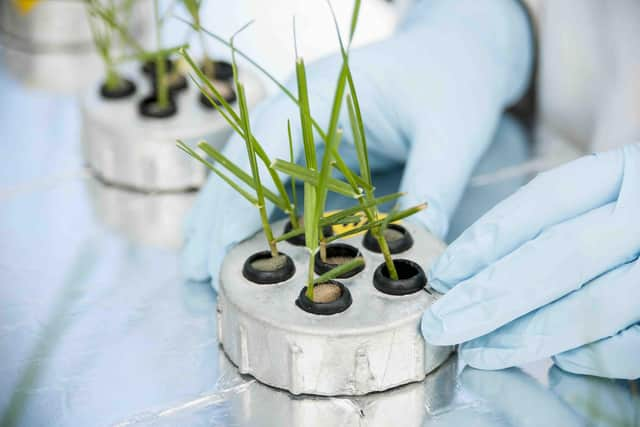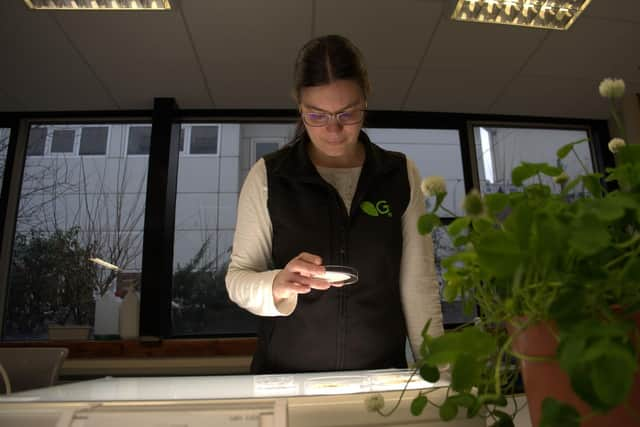Founded in 1825, Northern Ireland's Germinal set to pioneer the evolution of the seed industry
and live on Freeview channel 276
Northern Ireland firm Germinal is set to benefit from a multimillion UK Department of the Environment, Food and Rural Affairs (DEFRA) funding package to transform grassland dairy and meat production by eliminating dependence on nitrogen fertilisers.
The DEFRA has awarded £3.3million to the major on-farm trial and research scheme called Project ‘NUE-Leg (Nitrogen Utilisation Efficiency – Legume), which aims exploit innovations in plant breeding, soil microbiology, nutrition and grassland management to achieve improvements in the capacities of legumes, such as white and red clovers in combination with soil microbes, to fix nitrogen from fresh air.
Advertisement
Hide AdAdvertisement
Hide AdNew proprietary legume varieties have also been developed by Belfast-headquartered Germinal’s research division and Aberystwyth University (Wales) that improve the efficiency of protein uptake by cattle from grassland thereby reducing emissions of ammonia. Other varieties have been developed which contain tannins that reduce methane emissions by cattle.
Germinal, which will play an integral role in Project ‘NUE-Leg, is a sixth-generation family company with roots tracing back to 1825 in Belfast.
Mr. Paul Billings, managing director, Germinal UK & Ireland, said: “Nitrogen is an essential nutrient for growing grass. Without it we could not grow the grass we need to feed our livestock and produce the dairy and meat products we need.
“However, nitrogen fertilisers are also a major source of greenhouse gas emissions in their manufacture and transport, and from in-field losses such as nitrous oxide and ammonia. They are also a source of nitrate losses to our waterways. They are expensive and farmers have seen huge volatility in prices, particularly in the last two years when price fluctuations have been around 300%.
Advertisement
Hide AdAdvertisement
Hide Ad“Governments around the world have rightly said that we need to reduce our reliance on nitrogen fertilisers. We need a solution. Legumes such as white and red clovers grown with grass can fix nitrogen from the air, but with no emissions.
“A current grass sward with a good clover content could fix on average between 100 and 150 kg of nitrogen per hectare per year. The clover will use about 75 kg of this for itself. The rest is available to the grass.
“But what if we could maximise the capacity of clovers to fix nitrogen by ensuring we have enough clovers that can persist in the sward, and match them with the right soil microbes and the right nutrition? We also need to wrap this up in a management approach that supports farmers and gives them the tools and information they need to make this work in a commercial setting, and make a profit.
“This is what we want to achieve with Project NUE-Leg. We want to achieve a threefold increase in the capacity of clovers to fix atmospheric nitrogen up to 300 kg nitrogen per hectare per year and thereby eliminate the need for chemical nitrogen fertilisers.
Advertisement
Hide AdAdvertisement
Hide Ad“This project has the potential to be truly transformative for grassland farming in the UK and globally. It could be a game-changer in both cutting emissions and in supporting farm profitability. In this context, we are very grateful to the UK Government for this funding award which allows this important project to proceed to its next on-farm testing and proving phase.”


The objective of Project ‘NUE-Leg’ is to create the conditions in commercial farm settings that will enable clover to fix up to 300 kg of nitrogen per hectare per year, a large portion of which will be available for grass growth. At these levels, additional chemical nitrogen fertilisers needed for grass growth can largely be eliminated.
The project has drawn together scientific expertise and global leaders in plant breeding and soil microbiology, agronomy, carbon emissions and the farming and food supply chain. Project partners include Aberystwyth University, Germinal, Origin Enterprises, the James Hutton Institute, Agrecalc, Linking Environment And Farming (LEAF), Dovecote Farm, Pilgrim’s Pride, Müller UK & Ireland and the CIEL Innovation Centre.
Integral to the Openfolde family of companies, Germinal's influence spans the world, with a particular focus on the UK, Ireland and New Zealand. The group employs 108 individuals spread across eight sites.
Advertisement
Hide AdAdvertisement
Hide Ad

William Gilbert, chairman of Germinal and managing director at Openfolde, added: “As a sixth-generation company based in Belfast, we are honoured to be part of the collective leading the charge in sustainable agri-food production through the transformative 'NUE-Leg' Project. With substantial funding from the UK Department of the Environment, Food and Rural Affairs, in collaboration with Innovate UK, our commitment to on-farm testing marks a pivotal moment.
“We are pioneering a new era in grassland farming, eliminating the reliance on nitrogen fertilisers. This project not only propels our company into the vanguard of sustainable agriculture but also positions Northern Ireland as a beacon for climate-benefiting innovations, fostering a legacy of environmental stewardship and progress for generations to come."